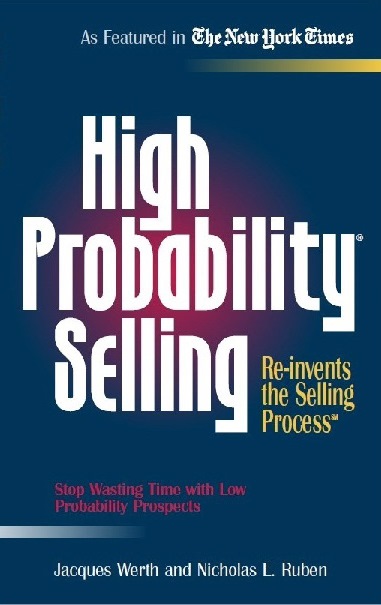
So You’ve Read the Book – Now What?
If you have any questions about High Probability Selling, we are having a live and interactive video meeting on Zoom
By Jacques Werth, President
High Probability Closing is not an event. It’s an integral part of the entire sales process. We define “closing” as Mutual Commitment. Therefore, we request the prospect’s commitment at every step of the sales process, and we make corresponding commitments. We close throughout the entire sales process – typically between 25 and 45 times.
Closing starts when we set the appointment and then ask, “If we can meet all of your conditions of satisfaction for (this product or service), what will you do?” If the prospect doesn’t reply with “I’ll buy it,” or words to that effect, we immediately cancel the appointment, for now. However, we will continue to call the prospect every three to four weeks until he/she is ready to make a conditional commitment.
Most salespeople set out to contact a large number of people who have an apparent need for their products and service. Their objective is to convince every one of them to grant them an appointment.
If we don’t get a commitment at any step of the sales process, we determine whether the commitment that isn’t accepted is a deal breaker. If so, we terminate the sales process (perhaps temporarily) and we leave. Why? Staying and pitching to a prospect who does not make commitments almost guarantees the following:
Think about how you would react if you were the prospect. This salesperson has given you all the information you need to make a decision when you were not ready to buy. Though mildly annoyed, you listened to their entire sales pitch. Now, when you are ready to buy, isn’t it likely that you will check what his/her competition has to offer? If the competitor’s salesperson appears equally competent and seems to have as good a deal, who are you most likely to buy from? Will you buy from the salesperson who is there now, or will you have him/her leave and call back the one who you wouldn’t buy from before?
However, if the prospect is ready to buy and we do arrive at mutual commitment throughout the initial sales process, we hardly ever encounter any “think it over” objections at the end. The prospect has just made dozens of commitments and affirmations of their intention to buy every feature, benefit and detriment of your product or service. At that point the prospect is anxious to consummate the sales process and get the benefits of your products and/or services. They have literally convinced themselves of the practicality of those decisions. The human mind operates like a self-validating computer. It does not doubt its own data.
People who utilize this process attain very high closing averages, both per number of prospecting offers and per number of prospect visits.

If you have any questions about High Probability Selling, we are having a live and interactive video meeting on Zoom
Ultimately, staying in the game is the deepest Why behind our decisions. When examining how we make our decisions, we
Take the first step toward mastering a proven sales system that works. Whether you’re just starting with the High Probability Selling book or looking for advanced training and coaching, we have the tools to help you succeed. Explore our resources and begin transforming the way you sell—consistently and confidently.